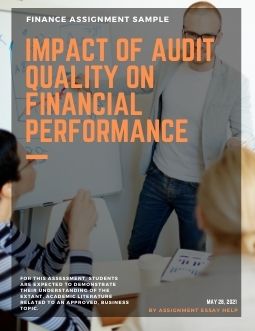
You can download the sample Finance Resource essay on Financial Accounting Report with the following question for free at the end of this page. For further assistance with Finance Assignment help, please check our offerings in Finance assignment solutions. Our subject-matter experts provide online assignment help to Finance students from across the world and deliver plagiarism free solution with a free Turnitin report with every solution.
(AssignmentEssayHelp does not recommend anyone to use this sample as their own work.)
Finance Assignment Question
For this assessment, students are expected to demonstrate their understanding of the extant, academic literature related to an approved, business topic.
In consultation with their lecturer, students need to decide on a business-related topic/concept. Students need to select approximately eight to twelve (8-12), but at least three (3), peer-reviewed articles or comparable sources (online resource can be accessed using ProQuest or Google Scholar) that are related to the topic (as the basis of their literature review).
In the context of their chosen topic, students need to review the articles and sources selected, i. e. read and critically analyse (compare and contrast) the literature. In doing so, students are required to discuss the key ideas/arguments put forward by authors, identify communalities/similarities, differences and conclusions drawn by different authors. Based on this analysis and discussion, students are expected to point out potential gaps in the literature that will form the basis of Assessment 2, the research proposal.
Marking criteria of the literature review include: the quality and currency of the literature selected; the student’s ability to compare and contrast author’s arguments/viewpoints and identify gaps in the existing literature in the context of the chosen business topic; the demonstrated ability to use Harvard referencing.
Finance Assignment Solution
Literature Review
Theoretical Framework
Auditor’s Theory of Inspired Confidence
The theory of inspired confidence that was introduced by (Cooke and Hudaib, 2009) suggested that the auditor acts as a confidential representative that formulates his board activity in society from the requirement of proficient and independent examination as well as the requirement of a proficient and independent intuition supported by the observations. Hence, auditors and accountants are intended to identify and understand that the public persists in intending a lower rate of audit failures (Cheong, et al., 2015). This needs that the auditors must design and conduct their audit in such a way that will reduce the implication of unidentified material misrepresentations. The accountant is under a responsibility to perform his task in such a way that does not mislead the confidence of the accountant (Cooke and Hudaib, 2009). The significance of this theory is that the roles of the auditors are a medium that is granted by the society on the achievement of the audit mechanism and the affirmation which is conveyed based on the accountant’s opinion. Though this theory analyses the presence of the audit mechanism, a deception of confidence refers to the completion of the function or process (Altamuro, Beatty, 2010). Hence, auditors are predetermined to manage reasonable quality affirmation, especially when it is given that a failure of the audit is adequately a career-ending activity. An audit provides affirmation to the management and owners of companies and stakeholders and investors, and along with a financial statement, regulations and corporate governance support determination in the capital markets (Bett, 2014).
Agency Theory
Theory of agency has been broadly implemented in the literature to determine the imbalance of information between agent and principals. This research implements the theory of agency to explore the effect of quality of audit on the financial statement of listed industrial engineering firms in the UK. As per agency theory, Abolmohammadi and Sarens (2007) stated that a firm comprises of a list of linked agreements between managers and economic resource’s owners who are owned with implementing and regulating these resources. In agency theory, Meckling and Jensen (1976) stated that agents have more data as compared to principles and this data asymmetry indirectly influences the ability of principles to direct whether their interests are properly addressed by agents. Meckling and Jensen (1976) think that the moral threat constitutes an instance were to expand their own revenues, agents might face the problem of substituting against their principal’s interests. Though principals do not have right to retrieve all information present during the time when the decision is taken by a representative, they are not able to explore whether the movements of agents are in favour of the company (Kasiva, 2012). To mitigate the possibility of moral threats, agents and principals get enlisted in agreement to acquire optimality which involves the development of monitoring procedures such as auditing (Sayyar, et al., 2014). The agent-principal association, as defined in the theory of agency is significant to determine how the responsibility of an auditor has established. Principals hire agents and envoy some authority for taking a decision. Doing such a thing, the principals show their confidence in their representatives to serve in favour of principals (Ardiana, 2014). However, due to the imbalance of data between agents and principals, principals might lose faith in their agents and might require to put them into processes such as audit in order to strengthen their faith (Farouk & Hassan, 2014). Thus, agency theory is an appropriate financial theory of responsibility which helps to describe the establishment of quality of audit.


 WhatsApp Us
WhatsApp Us